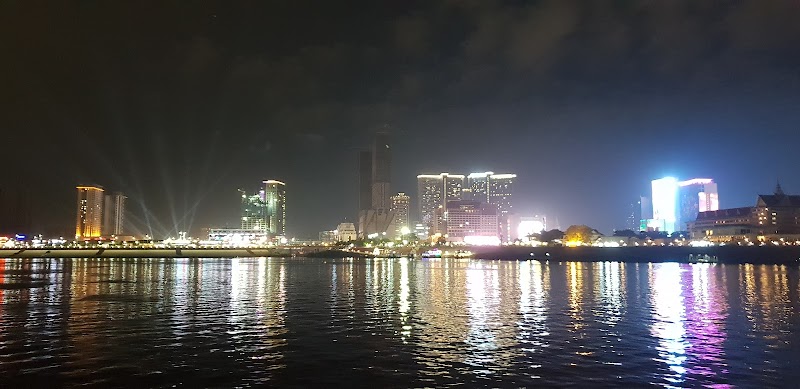
Racing Currents and Moonlit Nights: Experiencing Phnom Penh's Water Festival
Phnom Penh's Water Festival offers an electrifying blend of culture, river races, and nighttime lanterns that bring the city to life every year. Discover how to plan your visit to this unique event, where natural forces and human celebration merge in a local spectacle.
Book Accommodations Early
Hotels near the river front fill up months in advance. Secure your stay early to avoid last-minute price hikes or inconvenient locations.
Stay Hydrated and Dress Light
October and November remain warm and humid. Carry water and wear breathable clothing to stay comfortable amid crowds and outdoor festivities.
Use Reliable Transportation
Traffic and road closures increase during the festival. Arrange tuk-tuks or boats in advance to guarantee smooth travel around event zones.
Respect Festival Etiquette
Photography is welcome but avoid disrupting ceremonies or boat races. Be mindful of local customs and crowd control for a respectful and safe experience.
Racing Currents and Moonlit Nights: Experiencing Phnom Penh's Water Festival
Phnom Penh pulses with energy during the Water Festival, a three-day spectacle that commands the banks of the Mekong River with vibrant boat races, illuminated processions, and lively crowds. This annual event, locally called Bon Om Touk, celebrates the reversal of the Tonle Sap River current, a natural phenomenon that shapes the region’s agriculture and fishing traditions. Fluent in history and teeming with practical adventure, the festival invites visitors to witness a collision of culture, water, and celebration in the Cambodian capital.
On the waterfront, long, narrow dragon boats slice through the river's fast-moving waters, steered by teams whose synchronized rowing matches the intensity of a thunderstorm. The river itself dares you to keep pace, pushing the vessels forward with relentless currents. Spectators line the quays, their cheers weaving into the rhythm of drums and horns that propel the races. As daylight fades, the city transforms — boats turned into floating lanterns drift downstream, reflecting thousands of flickering lights on restless water.
Planning a trip to Phnom Penh during the Water Festival demands practical timing. The event usually occurs in late October or early November, triggered by lunar cycles, so check the calendar carefully to reserve accommodations well in advance. The riverfront areas fill quickly, but urban neighborhoods nearby offer good alternatives. Comfortable walking shoes are essential for exploring the packed streets and riverbanks, while lightweight rain gear can shield you from sudden tropical showers.
Engage with the festival through both its grand spectacles and its quieter moments. Visit local markets where vendors sell fresh Mekong fish and grilled street food, grounding your experience in Cambodia’s practical pulse. Prepare for large crowds with a water bottle and a sense of patient adventure — movement is deliberate here, a dance between human celebration and natural forces.
Whether you’re drawn by the thrill of the races, the cultural richness, or the chance to stand beside a river fiercely alive with history and life, the Water Festival in Phnom Penh is an accessible adventure. It respects tradition and the environment as fragile partners, offering a window into Cambodia’s enduring relationship with water. By immersing yourself in the practical details and sensory moments — the slap of oars, the sparkle of lantern light, the hum of voices and engines — you lean in close to a festival fiercely itself, alive and unyielding.
Nearby Trips
All Adventures
Boat Charters
Water Activities
Adventures near Phnom Penh, Cambodia
Discover the unique and memorable adventures that make Phnom Penh, Cambodia special.
Frequently Asked Questions
When exactly does the Water Festival take place each year?
The Water Festival occurs on the 14th to 16th day of the 10th lunar month, usually falling in late October or early November. The date shifts annually because it's based on the lunar calendar.
Are boat races open to public participation or just professional teams?
Boat races are held by local professional teams and communities; spectators can watch from riverbanks but do not participate. The competition is fiercely serious and coordinated.
What local foods are best to try during the festival?
Try grilled Mekong fish, nom banh chok (Khmer noodles), and fresh tropical fruits sold at riverside markets. Street vendors offer seasonal specialty snacks that complement the festive atmosphere.
Is it safe to attend the festival with children?
Yes, but the crowds can be dense. Keep a close eye on children near water and in busy areas. Early evening visits are calmer and better suited for families.
What environmental efforts support the festival?
Local authorities encourage waste management programs and have started clean-up campaigns to protect the Mekong River from pollution, promoting biodegradable materials during events.
Are there lesser-known viewing spots to avoid crowds?
Yes. The Chroy Changvar Bridge offers elevated views away from the main quays. Small riverbank parks north of Phnom Penh also provide quieter spots with good vantage points.
Recommended Gear
Comfortable Walking Shoes
Essential for navigating crowded riverfront and city streets, ensuring comfort during long periods on your feet.
Reusable Water Bottle
Stay hydrated during lengthy outdoor festivities in humid conditions.
Compact Rain Poncho
Quick protection against sudden tropical showers common in this season.
Camera or Smartphone with Extra Battery
Capture boat races and glowing lantern processions; consider battery packs to keep devices powered.
Local Insights
Hidden Gems
- "Chroy Changvar Bridge vantage point"
- "Small riverside parks on the Mekong's north shore"
- "Early morning market walks for festival preparations"
Wildlife
- "Mekong dolphins rarely seen but historically present"
- "River fish species like snakehead and catfish that locals celebrate"
- "Migrating waterbirds attracted by the changing river currents"
History
"The Water Festival traces back centuries, celebrating the natural reversal of the Tonle Sap River and the ancient Khmer kingdom's reliance on its waterways for agriculture and transportation."
